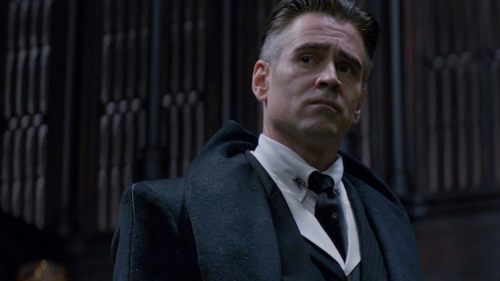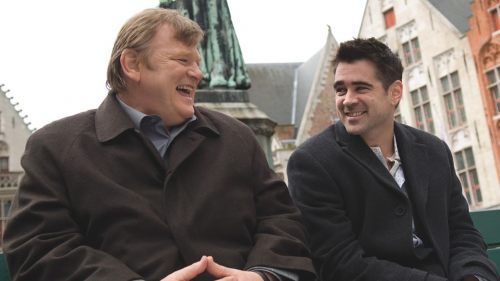Beyond Fest: WIDOWS Is The Feminist Michael Mann Riff You Never Knew You Needed
Steve McQueen makes "serious" movies. Regardless of whether or not you admire his impressive control over cinematic craft, none of his three features to date (Hunger, Shame, 12 Years A Slave) are necessarily easy to enjoy in a traditional sense. After all, this is a man who famously dropped out of NYU's film program because the prestigious university's professors wouldn't let him "throw the camera up in the air". The director's early experimental shorts – such as the menacingly erotic Bear and Buster Keaton tribute Deadpan – were wonderful to behold (and earned McQueen Britain’s most prominent art award, The Turner Prize) but didn't exactly point toward the artist possessing a remotely commercial mindset. Hell, as the budding English auteur's partner in crime (Michael Fassbender) was appearing in X-Men and Quentin Tarantino movies, the two re-united for a chilly, distant picture about a sex addict, filmed in poetically disquieting long takes that examined one man's isolated damnation.
So, when it was announced that McQueen would be teaming up with mystery author Gillian Flynn (Gone Girl, Sharp Objects) for a heist thriller in which a collective of widows carry out their deceased husbands’ final planned job, the news arrived to some puzzled looks from cinephiles around the globe. What the hell would a piece of Steve McQueen pulp even look like, and would his more radical tendencies/techniques remain? Furthermore, nothing in his filmography to date hinted at the UK director being remotely interested in staging something approaching an action set piece (remember Hunger's seventeen-minute dialogue scene?). Even 12 Years a Slave – which earned McQueen a Best Director nod and the production a Best Picture win – was as harsh and uncompromising as even his most confrontational shorts.
With Widows, McQueen has made his first instantly satisfying and entertaining motion picture. A redux of Lynda La Plante’s '83 six-part British television series of the same name*, the result is a two-fisted genre film that also acts as a screed on race, gender, and economic status, balancing its rollicking heist narrative with weightier political messaging. For some, this may be too much, as Flynn's words and McQueen's direction combine for a work that is both soapy and self-serious, yet never anything less than thrilling. It's a mainstream movie where its art house author hasn't diluted his radical voice one iota, while simultaneously embracing the somewhat trashy melodrama of its source without a single ounce of irony or shame. In short, if all American multiplex fare played with similar in-your-face energy, the mainstream cinematic landscape would be a lot more interesting.
The time is now. The place: Chicago. In an absolutely stunning opening sequence, a collective of career crooks – lead by gruff wheelman Harry (Liam Neeson, proving he can work wonders with a role of any size) charge through downtown with the cops on their tail. Thanks to McQueen's regular editor Joe Walker (who has some action experience under his belt with Sicario and Blackhat), the breathless pursuit is broken up by tiny interludes where we meet each of the players and learn everything there is to know about them through simple interactions. Florek (Jon Bernthal) is the abusive muscle, telling Alice (Elizabeth Debicki) to cover up the black eye he gave her so it doesn't embarrass them both. Carlos (Manuel Garcia-Rulfo) keeps racking up gambling debts instead of helping Linda (Michelle Rodriguez) pay the rent on her self-managed party store. Coburn (Brian King) is never there for Amanda (Carrie Coon) and their new infant. After a garage shoot out and explosion, all that's left is Veronica (Viola Davis) – La Plante’s Dolly Rawlins re-named – brushing the empty side of her bed and staring out the windows of a posh loft, desperately wishing Harry could wrap his arms around her one last time.
While the title of Flynn and McQueen's picture hints at an ensemble piece (which, admittedly, it is), Widows belongs to Davis, who is an absolute force of nature. After the mournful howl she lets out before her husband's funeral, there's a single-minded stoicism to the way she approaches the task at hand. Granted, Veronica can never take her eyes off of this tarnished brass ring, because if she doesn't pay back the $2 million Harry and his crew stole from corrupt political candidate Jamal Manning (Brian Tyree Henry) within thirty days, he's going to sic his terminator brother Jatemme (Daniel Kaluuya) on her and the rest of the surviving women. Davis transforms Veronica into a classic neo noir heroine, willing to even blackmail those who won't cooperate with her quest as she totes around an adorable Westie pup wherever she goes. It's easily one of the year’s best performances, and further proof that Davis is one of the strongest actors working today, all but becoming the physical manifestation of human will.
Though we’re treated to glimpses of Linda and Amanda's existence, Alice – the youngest member of this new girl gang – is gifted the most screen time out of the titular grieving spouses. Debicki is absolutely magnetic, drawing us in to the confusion she feels after having the brutal provider she's obviously always leaned on get yanked off this mortal coil without a moment's notice. Her mom (a domineering Jackie Weaver) suggests Alice enter the world of high class prostitution, which results in an ongoing relationship with a rather gentle (yet no less misogynistic) sugar daddy (Lukas Haas). Always the astute visual artist, McQueen exploits this relative newcomer's Amazonian height whenever she shares the frame with the former child star; though Alice may tower over her new paying beau, his sex and status still grant him all the power in the relationship. As you can imagine, much conflict (and commentary) is derived from a subplot most other thrillers would excise in favor of action beats.
Engulfing all of these high pulp players is a swirling miasma of political corruption that threatens to overwhelm the movie. Manning is running for alderman against Jack Mulligan (Colin Farrell), the nepotism aided offspring of a racist old school Windy City figurehead (Robert Duvall). However, the small time crime boss has an opportunity to become the first black leader in his ward because its borders have been redrawn, forcing the Irish mainstay to glad-hand and even create jobs/allies in black neighborhoods he otherwise wouldn't step foot in. Farrell and Duvall are a perfect (if somewhat obvious) pairing in these roles, with Jack barely keeping it together whenever his dad starts barking about "those people". This side story allows McQueen to play a bit more than the violence does, such as when he mounts a camera on Jack's limo while he bickers with his manager, and we watch a poor neighborhood blend into a gentrified suburb within a matter of blocks. It’s yet another risky call in a career dominated by them, as McQueen’s regular cinematographer Sean Bobbitt captures this deliberate sociopolitical shot with the same ease as he does a cannon shot car chase.
However, none of these "powerful" men are nearly as intimidating as Kaluuya's almost silent killer, who borders on becoming a real movie monster throughout the course of Widows' all-too-brief 130-minute runtime. Every time Jatemme enters a scene, it's pretty much a guarantee that someone else is going to get beaten, tortured or murdered without a hint of remorse. Kaluuya has always been a fantastic supporting player (see: his DEA partner in Sicario) and rightfully earned a Best Actor nod last year for naturalistically becoming the calm, rational, coveted center of Jordan Peele's horror movie monument, Get Out. Yet in Widows, Kaluuya displays a knack for terrifying mayhem that's never been hinted at throughout the rest of his career. The resolution of a scene involving free-styling rappers is going to stick with an audience long after the credits roll, because McQueen finds another perfect subject for one of his now trademark long takes, which ends with flinch-inducing brutality.
Thankfully, Kaluuya and the other seedier elements of Widows are injected whenever the movie threatens to tip the proverbial scale from "heavy-handed yet insightful" to full-blown "ham-fisted" territory. One of the main problems of Flynn and McQueen's script is that it often feels like an entire season of an HBO series crammed into two hours. This means we're dealt one B/C narrative too many (especially once it comes to the tragic death of Harry and Veronica's son), and all that sociopolitical posturing threatens to overstuff the picture. At the same time, it would've also been nice to spend a few more minutes with Cynthia Erivo's babysitter-come-driver, whose sprints through the Southside streets act as thrilling interludes. To its credit, the film's constant desire to "say something" also pays off in unique ways, as strategically placed Obama signs indicate that no ideological leaning is off limits for McQueen's scrutiny; though the picture may be incredibly entertaining, that doesn't stop it from owning a rather venomous cynical streak, even when it comes to America’s rose-tinted glasses regarding its last President’s reign.
Widows wouldn't be a proper crime melodrama if it didn't contain some late-in-the-game twists, and a few of these shocking reveals are possibly going to make or break many audience members' complete enjoyment of the picture. However, for the majority of the movie, McQueen is doing a very sturdy feminist Michael Mann impersonation, complete with all the steel, glass, and pensive staring over bodies of water that we've come to expect from that action maestro (all while Hans Zimmer’s Nolan-ready strings and electric guitar rise and fall). So, even though Widows may not be a perfect motion picture, it still serves as concrete proof that McQueen can port over his usual punishing fascinations into a commercialized mode. This is big, bold, operatic genre cinema, and we're all the better for it.
*Widows was also followed by sequels Widows II ('85) and She’s Out ('95), which all followed central character Dolly Rawlins.
Widows was presented as part of Beyond Fest.



